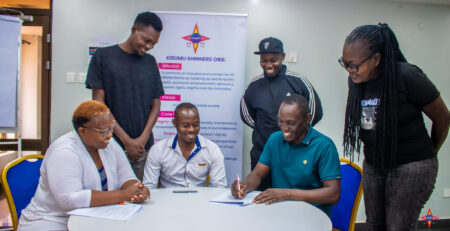Community-Led Interventions to Address Drug Use and Financial Hardship Among MSM in Western Kenya
admin2024-09-24T20:42:23+00:00In the heart of Western Kenya, the LGBTQ+ community faces a growing crisis that often goes unnoticed: the connection between financial hardship and substance abuse, particularly among men who have sex with men (MSM). Although there is limited research on how financial struggles directly contribute to drug use within this group, discussions and outreach efforts have brought the issue into sharper focus. Our recent community outreach programs have uncovered a troubling link—those experiencing financial hardship are more likely to engage in drug use, highlighting the urgent need for targeted interventions.
Understanding the Challenge: Financial Hardship and Drug Use
Financial instability can drive individuals toward risky behaviors as a means of coping, and for the MSM population in Western Kenya, this reality is all too common. Economic hardships are compounded by stigma, discrimination, and limited access to supportive services. These factors create an environment where individuals turn to drugs and alcohol as a way to manage stress, mental health issues, and societal pressure.
Through extensive community engagement, we have learned that MSM facing financial hardship are at higher risk of substance abuse, which in turn exacerbates their vulnerability to HIV/AIDS and other health-related challenges. This growing problem has become a priority for our organization as we strive to create sustainable, community-driven solutions.
Community-Driven Solutions for Lasting Impact
Our organization is committed to reducing the burden of drug and alcohol abuse within the gay, bisexual, and other men who have sex with men (GBMSM) and male sex worker (MSW) communities. Our approach focuses on improving access to Youth-Friendly Health Services, which are crucial in supporting the unique needs of these populations. By enhancing these services, we aim to not only address substance use but also tackle the broader health concerns within the LGBTQ+ community.
In addition to substance abuse, our project also seeks to mitigate the prevalence of HIV/AIDS and intimate partner violence (IPV), both of which are prevalent issues affecting queer people in the region. Through a combination of education, outreach, and community support, we aim to empower individuals to make healthier choices while providing them with the tools and resources they need to overcome financial hardship.
A Collaborative Approach to Change
At the core of this project is collaboration. We believe that the best solutions are those that come from within the community itself. By working closely with local leaders, health professionals, and community members, we are creating a holistic approach that addresses the root causes of drug use and financial instability. Our outreach efforts are designed to foster trust and open dialogue, allowing us to better understand the unique challenges faced by MSM in Western Kenya.
We are also partnering with local and international organizations to provide financial literacy training, job opportunities, and mental health support to those most at risk. These interventions are critical in helping individuals break free from the cycle of poverty and substance abuse, leading to healthier, more resilient communities.
The Path Forward: A Brighter Future for MSM in Western Kenya
Our project’s overall goal is clear: to reduce cases of drug and alcohol abuse among the GBMSM and MSW communities in Western Kenya. By addressing the underlying issues of financial hardship and improving access to health services, we hope to create lasting change. This initiative is more than just a response to an immediate crisis—it’s a long-term commitment to the health and well-being of the LGBTQ+ community in Western Kenya.
Together, we can build a future where financial hardship no longer leads to substance abuse, where HIV/AIDS and IPV are less prevalent, and where MSM can live healthier, more fulfilling lives. Through community-driven initiatives, we are paving the way for a brighter, more inclusive tomorrow.

















Leave a Reply